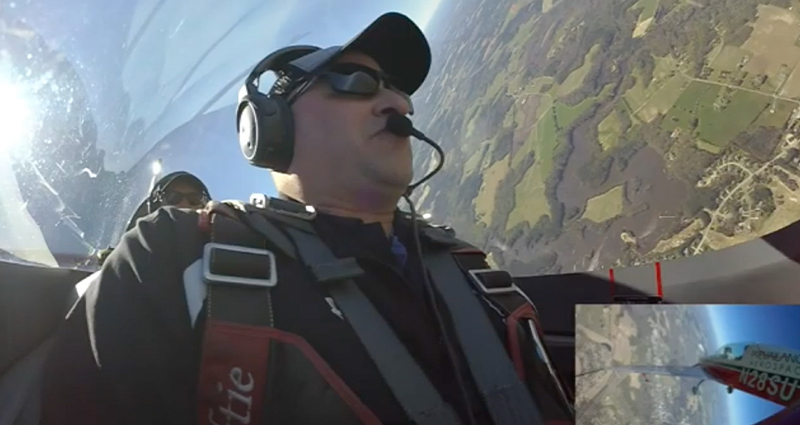Morris Plains, NJ, Nov. 05, 2024 (GLOBE NEWSWIRE) -- 
There is no doubt in my mind that flying is the way humankind is meant to travel. Yet, the continued success and growth of the industry require a refined approach to safety. As someone who flies commercially and has a new interest in an aviation career, I want the reassurance that the pilot in command (PIC) and crew are adequately prepared if an aircraft ends up in an upset.
Invest in Improvement
According to the FAA’s Advisory Circular 120-111, an upset is defined as an airplane in flight unintentionally exceeding the parameters normally experienced in line operations or training:
- Pitch attitude greater than 25 degrees nose up
- Pitch attitude greater than 10 degrees nose down
- Bank angle greater than 45 degrees
- Within the above parameters, but flying at airspeeds inappropriate for the conditions1
Having just completed a summer internship with an advanced flight training academy, I gained a new perspective on the importance of safety and how comprehensive training enhances each pilot’s capabilities. Upset prevention & recovery training (UPRT) is a small investment for any flight department, and it significantly improves each pilot’s level of proficiency at every attitude. It puts pilots through a comprehensive training syllabus that reduces risk, enhances the safety mindset and ultimately saves lives.
Why Challenge Yourself?
There is no question that there are obstacles in every industry. Aviation, however, is uniquely dynamic. Regardless of the aviation business sector that any given role touches, the industry is constantly working to mitigate risk. That includes risk in systems interoperability, platform aerodynamic design, weather and operational necessities. It is inherently a risky business.
Consequently, individuals must challenge themselves to get better. That means taking a holistic approach to determine where risk lies in your daily operations and then challenging yourself, the organization and the operation to improve. That might be a tabletop exercise, a crew resource management (CRM) discussion applicable to loss of control inflight (LOC-I) or improving ground operations to prevent future incidents that damage equipment and significantly impact the bottom line.
The leading cause of aviation accidents remains LOC-I. These LOC-I incidents are generally initiated by human error, environmental factors or systems failures. Stall events are a leading causal factor that has led to loss of life. This means that the status quo is not enough, and everyone needs to challenge themselves where the challenges are readily available. It may be as simple as the transition from a tabletop or simulator to a real-world environment.
Fight or Flight?
Psychosocial rehabilitation specialist Kendra Cherry noted, “The fight-or-flight response plays a critical role in how we deal with stress and danger in our environment. When we are under threat, the response prepares the body to either fight or flee. By priming your body for action, you are better prepared to perform under pressure.”
However, when the unexpected happens at 20+ thousand feet, this response, or startle, manifests in freezing and a reduced ability to process information. Startle can impair judgement and slow down critical thinking skills.
Exposure to emergency-like situations in a controlled environment helps mitigate this startle response and allows aviation professionals to stay clear-minded during any event. Needless to say, nose low and inverted is not the time to develop a strategy. Your passengers and crew will be more than “upset.”
The video clip below captures a pilot working through an upset within the high safety margins of an Extra 300 prior to being faced with one in the aircraft that he flies daily.
Final Approach
Safety and risk mitigation are the keys to success in aviation. UPRT is one definitive example, but there are countless others. Invest in yourself, prepare for the unexpected and mitigate risk to the greatest extent possible in daily operations. Stay vigilant with your safety focus, dedication and perseverance to keep the aviation industry safe and thriving.
Resources:
1 FAA. (2017). AC 120-11 CH 1: Upset Prevention & Recovery Training. Retrieved September 25, 2024 from https://www.faa.gov/documentLibrary/media/Advisory_Circular/AC_120-111_CHG_1_Ed_Upd_3.pdf
2 33rd AOPA Air Safety Institute Accident Report. (nd). AOPA. Retrieved September 25, 2024 from https://www.aopa.org/training-and-safety/air-safety-institute/accident-analysis/richard-g-mcspadden-report#:~:text=Accident%20rates%20in%20both%20non-commercial%20fixed-wing%2C%20commercial%20fixed-wing%2C,causal%20factor%20and%20weather-related%20accidents%20remain%20highly%20lethal.
3 Cherry, Kendra.(2024). What is the Flight-or-Fight Response? VeryWellMind. Retrieved September 25, 2024 from https://www.verywellmind.com/what-is-the-fight-or-flight-response-2795194.
About Global Aerospace SM4 Aviation Safety Program
The Global Aerospace SM4 Safety Program has revolutionized the way insurance specialists help their clients achieve higher levels of operational safety. SM4 was built on the concept of integrating four critical safety components: planning, prevention, response and recovery. Its mission is to help organizations manage risk, enrich training efforts, strengthen safety culture and improve safety management systems. https://sm4.global-aero.com/
Global Aerospace SM4 Aviation Safety Program Media Contact
Suzanne Keneally
Vice President, Group Head of Communications
+1 973-490-8588
